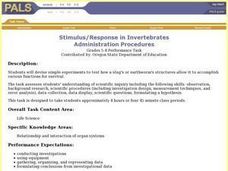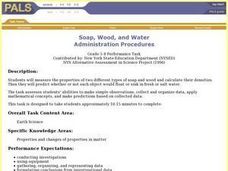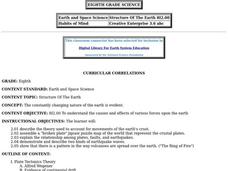Curated OER
Rubber Band
Eighth graders investigate what would happen to the length of a rubber band as more and more rings were hung on it. They base their explanation on what they observed, and as they develop cognitive skills, they should be able to...
Curated OER
Changes in Pulse Rate
Eighth graders practice making observations and collecting data after determining a baseline pulse rate then collect data on the changes in that rate with exercise. Students must organize their data and analyze their observations.
Curated OER
Stimulus/Response in Invertebrates
Students design and conduct and experiment to determine how invertebrates react to an outside stimulus such as light and other stimuli. Student must develop a clear plan of action, collect data in an organized manner and analyze their...
Curated OER
Dichotomous Key
Eighth graders use a dichotomous key to identify unknown fictitious organisms. They work individually during this exercise. The task is designed to take students approximately 15-25 minutes to complete.
Curated OER
Classification of Animals
Sixth graders examine two-way classification systems using four mutually exclusive groups and two dimensions simultaneously. They then are given a set of plastic animals, asked to create a two-way classification system, then asked to...
Curated OER
The Fault Line
Students use cardboard models of the North American and Pacific plates and sand to investigate what happens when there is an earthquake or movement along the boundaries of the plates.
Curated OER
Crustal Sinking
Students measure the rate of sinking of a test tube into a beaker of "glop", representing a model of the interaction between the Earth's crust and upper mantle. This task assesses students' abilities to make simple observations,...
Curated OER
Mapping the Blue Part
Eighth graders determine the location of specific features of the stimulated ocean floor. The features include the continental shelf, continental slope, an ocean trench, and a mid-oceaniz ridge.
Curated OER
Building Materials
Fifth graders are presented with three rocks and a variety of tools and are asked to investigate the properties of the rocks to see which rock is best for building tables and benches for a museum picnic area.
Curated OER
Creeping
Young scholars observe, measure, and graph a model of slow down slope movement representing soil creep. This task assesses students' abilities to collect, record, and organize data, set up graph axes, plot data points, draw line graphs,...
Curated OER
Water-holding Capacity of Earth Materials
Students design and conduct an experiment to test their ideas about how to speed up or slow down the rate of an enzyme-catalyzed reaction. They have access to an array of physical and chemical factors that might influence enzyme...
Curated OER
Probing Under the Surface
Eighth graders use a measuring stick to determine the shape of the inside of the bottom of a box, then apply their knowledge to an additional situation. This task assesses students' abilities to make simple observations, collect and...
Curated OER
River Planning
Students use a model to conduct an experiment involving dam construction. Based on their observations, they draw conclusions about social, economic, and and environmental issues and make a decision concerning dam location. As a group,...
Curated OER
Soap, Wood, and Water
Students measure the properties of two different types of soap and wood and calculate their densities. Then they predict whether or not whether or not each object would float or sink in fresh or salt water.
Curated OER
Scale Model of the Solar System
Students work in groups of 4-6 for the experiment/activity part of this exercise. Students know that earth is the third planet from the sun in a system that includes the moon, the sun, eight other planets and their moons, and smaller...
Curated OER
Wet-Dry Bulb Hygrometers: Measuring Relative Humidity and Apparent Temperature
Young scholars work in groups of 4 for the activity/activity part of this exercise. They know that clouds are formed by the condensation of water vapor, affect weather and climate. Also that global patterns of atmospheric movement...
Curated OER
Vitamin C Testing
High schoolers determine which of three beverage samples contains the most vitamin C. They then apply their knowledge to an additional situation. Students use beverages that have a large, definite difference of vitamin C content to...
Curated OER
Radical Raptors
Students define raptor, explain why raptors are important, describe unique physical characteristics of various types of raptors, and explain life cycle of raptors. Students then play Habitat Game, describe food and hunting habits of...
Curated OER
Couriers in the Inca Empire: Getting Your Message Across
Students explore how the Inca communicated across the bast stretches of their mountain realm.
Curated OER
Behind the Scenes -- Closing the Curtain on Stereotypes
Students examine stereotypes in their community. They discuss the implications of having stereotypes and being prejudice against a group of people. They use a five step process in which to create another outcome to an experience in which...
Curated OER
Alliteration
Students write and illustrate a sentence which names a letter of the alphabet. The sentence should have subject, verb, describing words, and incorporate alliterative techniques.
Curated OER
Technology-commected Folklife Lesson Plan: Fables
Learners discuss ways the stories were alike and different. The teacher demonstrate how to draw a Venn diagram using Microsoft Word. They label the two circles and enter the likenesses and differences on the diagram.
Curated OER
Unfold the Mystery of Mold
Middle schoolers research the conditions in which molds thrive. They apply the scientific method to develop a hypothesis, conduct research and test results.
Curated OER
Structure of the Earth
Eighth graders examine the forces that are constantly acting on the Earth. They describe the theory of tectonic plates and demonstrate the two kinds of earthquake waves. They also examine the role of volcanoes in the structure of the...

























